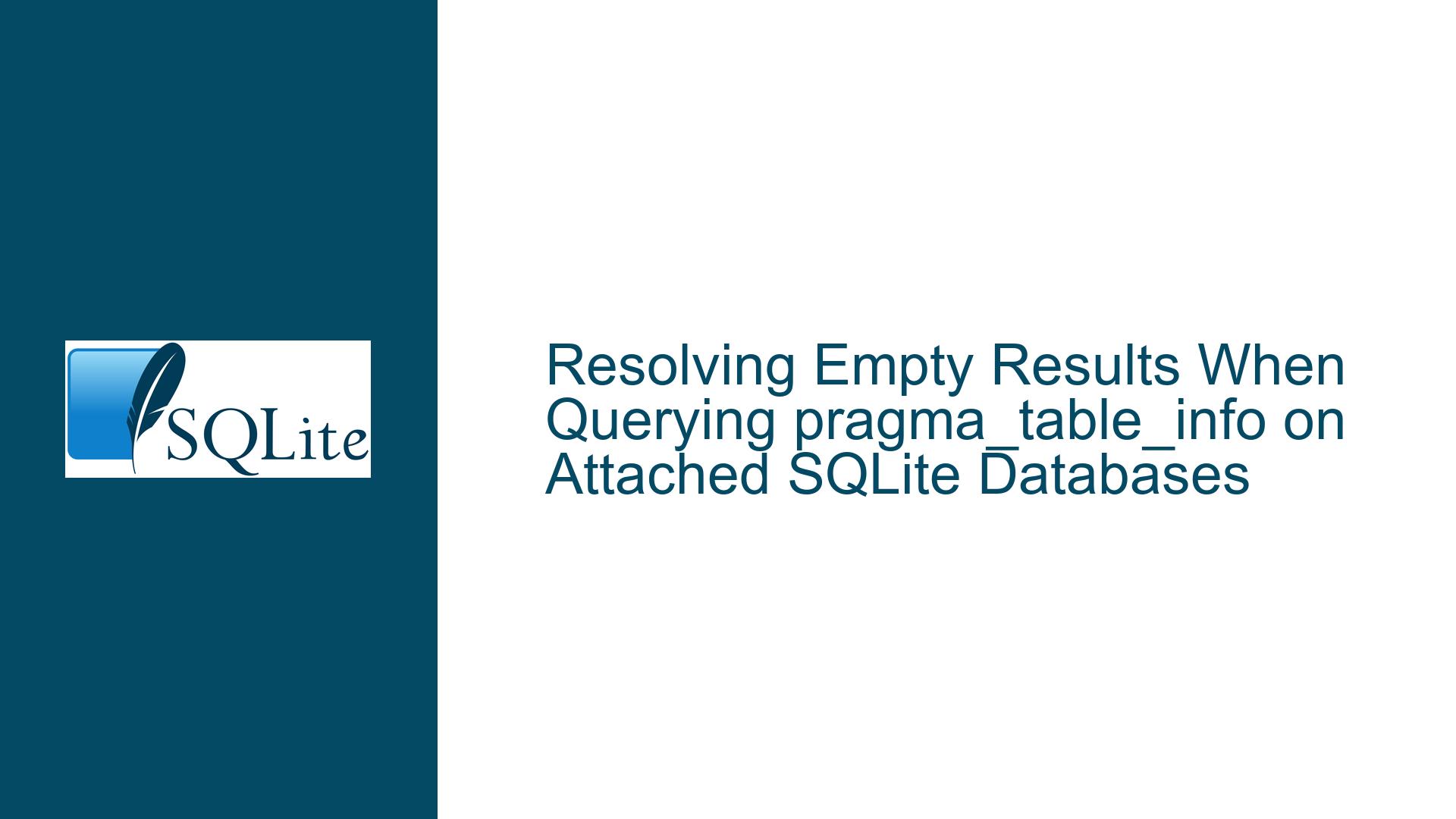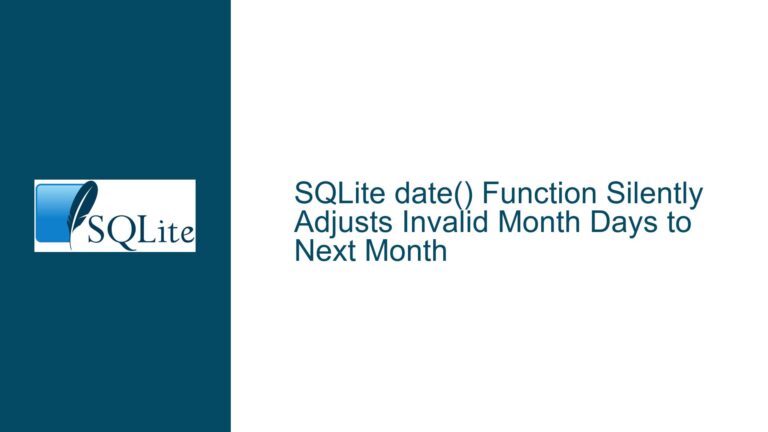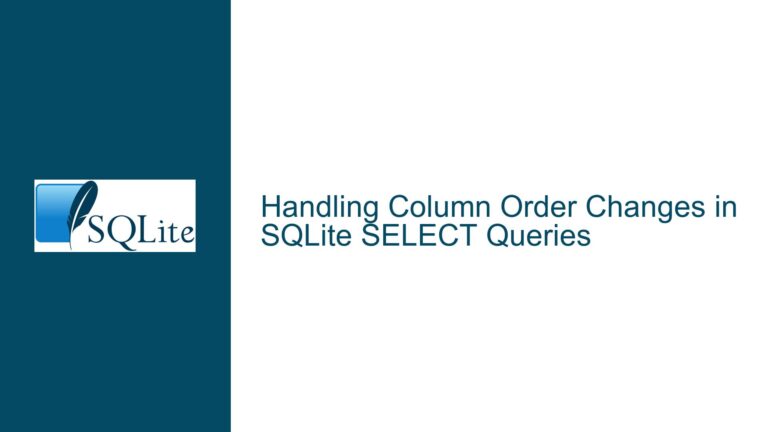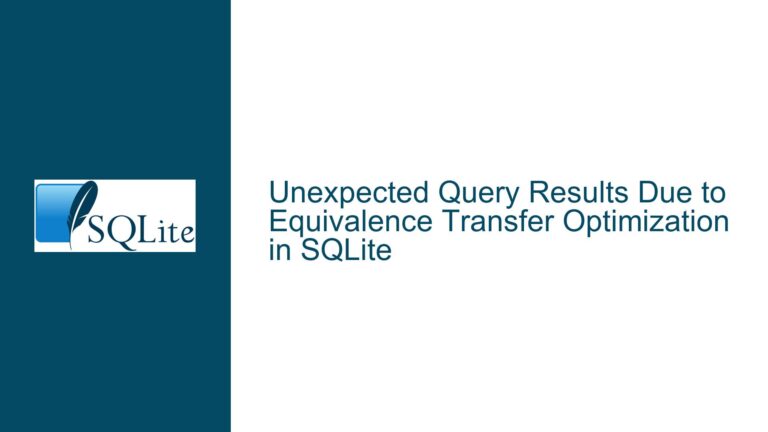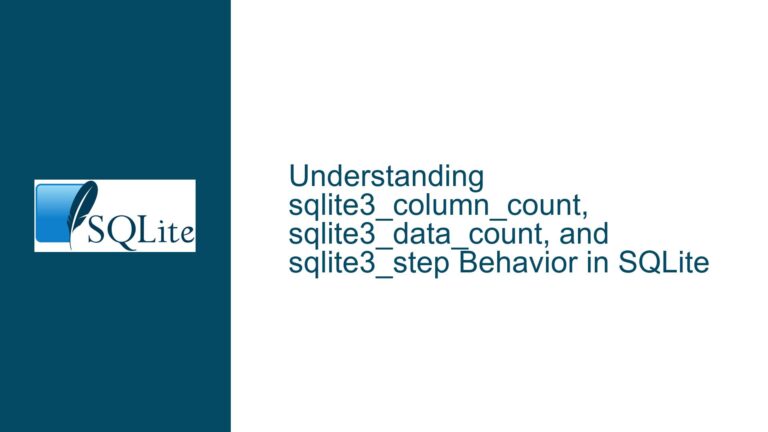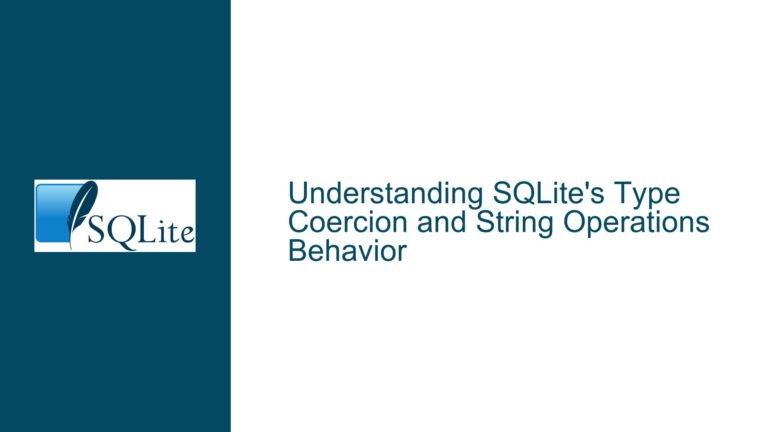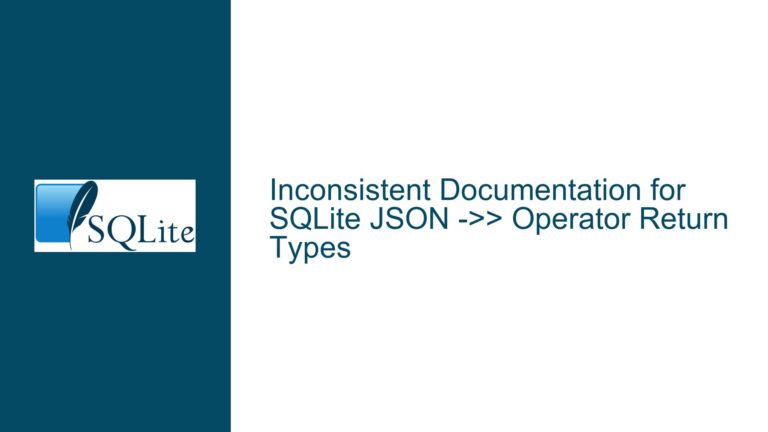Resolving Empty Results When Querying pragma_table_info on Attached SQLite Databases
Issue Overview: Mismatched Parameters in pragma_table_info When Accessing Attached Database Schemas
The core problem revolves around an application’s inability to retrieve table metadata using pragma_table_info when querying tables within an attached SQLite database. The code functions correctly against the main database but fails to return any rows when targeting an attached database, immediately returning SQLITE_DONE (101) during the first sqlite3_step() call. This behavior indicates that the query either references a non-existent object or contains structural flaws preventing execution.
Key technical elements at play include:
- Schema-Qualified Object Resolution: SQLite requires explicit schema prefixes (e.g.,
schema.table) when accessing objects in attached databases. The absence of proper schema qualification often leads to failed object resolution. - Parameter Binding for Pragma Functions: Misuse of parameter binding with
pragma_table_info, which expects a single schema-qualified table name parameter, not separate schema and table parameters. - Typographical Errors in Schema Handling: A critical typo (
schemaNammeinstead ofschemaName) disrupts schema name binding, causing invalid parameter values.
The code attempts to retrieve column metadata via pragma_table_info using two bound parameters: one for the table name and another for the schema. This contradicts SQLite’s requirement for a single schema-qualified table name argument. Additionally, the typo in the schema variable name results in binding an unintended value (likely an empty string), compounding the resolution failure.
Possible Causes: Parameter Binding Errors and Schema Qualification Misconfigurations
Cause 1: Incorrect Parameter Count for pragma_table_info
The pragma_table_info table-valued function accepts exactly one argument: the schema-qualified table name. Binding two separate parameters (table name and schema name) violates this requirement. SQLite interprets the first parameter as the entire table identifier. If the schema name is bound as a second parameter, it becomes an extraneous value with no effect on the query, leaving the function to process only the first parameter as the table name. Since the table name lacks schema qualification, SQLite searches for it in the main schema, not the attached database.
Example of Invalid Syntax:
SELECT * FROM pragma_table_info('owners_old', 'draft'); -- WRONG
Correct Syntax:
SELECT * FROM pragma_table_info('draft.owners_old'); -- CORRECT
Cause 2: Schema Name Variable Typo Leading to Empty Binding
The code contains a typographical error in the variable name schemaNamme (extra ‘m’), which likely references an uninitialized or empty string. This error propagates to the second parameter binding, effectively passing an invalid schema name. When combined with the incorrect two-parameter approach, this results in a malformed query that SQLite cannot resolve.
Code Snippet Highlighting the Typo:
res1 = sqlite3_bind_text( stmt2, 2, sqlite_pimpl->m_myconv.to_bytes( schemaNamme.c_str() ).c_str(), -1, SQLITE_TRANSIENT );
// ^^^^^^^^^^^^^^ Typo here
Cause 3: Implicit Schema Resolution Conflicts
When a table name is not schema-qualified, SQLite defaults to searching the main schema. Even if the second parameter were processed correctly (which it isn’t), pragma_table_info lacks a formal parameter for schema specification. This creates ambiguity in object resolution, especially when identically named tables exist in multiple attached databases.
Troubleshooting Steps, Solutions & Fixes: Correcting Parameterization and Schema Handling
Step 1: Consolidate Schema and Table Name into a Single Parameter
Rewrite the SQL query to use a single parameter representing the schema-qualified table name. This ensures pragma_table_info receives a properly formatted identifier.
Revised Query:
std::string query2 = "SELECT * FROM pragma_table_info(?)"; // Single parameter
Binding the Schema-Qualified Table Name:
std::string qualifiedTableName = schemaName + "." + tableName;
res1 = sqlite3_bind_text( stmt2, 1, qualifiedTableName.c_str(), -1, SQLITE_TRANSIENT );
Step 2: Fix the Schema Variable Typo
Correct the variable name schemaNamme to schemaName throughout the codebase to ensure the correct schema name is bound.
Before:
schemaNamme.c_str() // Incorrect variable name
After:
schemaName.c_str() // Corrected variable name
Step 3: Validate Schema and Table Existence in Attached Database
Confirm that the attached database contains the expected schema and table using direct SQL queries or command-line tools.
Using SQLite Shell:
ATTACH 'path/to/database.db' AS draft;
.tables draft.;
Programmatic Verification:
std::string checkTableQuery = "SELECT COUNT(*) FROM draft.sqlite_master WHERE type='table' AND name=?";
sqlite3_stmt* checkStmt;
if (sqlite3_prepare_v2(m_db, checkTableQuery.c_str(), -1, &checkStmt, nullptr) == SQLITE_OK) {
sqlite3_bind_text(checkStmt, 1, tableName.c_str(), -1, SQLITE_TRANSIENT);
if (sqlite3_step(checkStmt) == SQLITE_ROW) {
int count = sqlite3_column_int(checkStmt, 0);
if (count == 0) {
// Handle missing table error
}
}
sqlite3_finalize(checkStmt);
}
Step 4: Debug Parameter Values During Binding
Log the actual values bound to the SQL statement to verify they match expectations. Insert debug output before executing sqlite3_step():
std::cerr << "Bound qualified table name: " << qualifiedTableName << std::endl;
Step 5: Handle Schema Names with Reserved Characters
If the schema or table name contains special characters (e.g., spaces, punctuation), enclose them in quotes to prevent parsing errors:
std::string qualifiedTableName = "\"" + schemaName + "\".\"" + tableName + "\"";
Step 6: Update sqlite3_table_column_metadata Usage
The subsequent call to sqlite3_table_column_metadata requires explicit schema specification. Modify its parameters to include the attached schema name:
Original Code:
res = sqlite3_table_column_metadata( m_db, NULL, tableName.c_str(), fieldName.c_str(), ... );
Revised Code:
res = sqlite3_table_column_metadata( m_db, schemaName.c_str(), tableName.c_str(), fieldName.c_str(), ... );
Step 7: Test with Hard-Coded Schema-Qualified Names
Bypass parameter binding temporarily to isolate the issue. Replace the parameterized query with a hard-coded string:
std::string query2 = "SELECT * FROM pragma_table_info('draft.owners_old')";
If this returns data, the problem lies in parameter binding or variable construction.
Step 8: Review String Encoding Conversions
The code uses sqlite_pimpl->m_myconv for string conversions between std::wstring and std::string. Ensure this converter handles special characters and null terminators correctly. Test with ASCII-only table names to rule out encoding issues.
Step 9: Verify SQLite Version Compatibility
While the user upgraded to SQLite 3.40.0, confirm that the pragma_table_info function’s behavior hasn’t changed across versions. Test with older versions (e.g., 3.30.x) to check for regressions.
Step 10: Inspect Prepared Statement Errors
After sqlite3_prepare_v2, check for error messages even if the return code is SQLITE_OK. Some errors manifest later during execution:
if (res1 == SQLITE_OK) {
const char* errMsg = sqlite3_errmsg(m_db);
if (errMsg != nullptr) {
std::cerr << "Prepare warning: " << errMsg << std::endl;
}
}
Final Solution Code Snippet
std::string schemaName = "draft"; // Corrected variable name
std::string tableName = "owners_old";
std::string qualifiedTableName = schemaName + "." + tableName;
std::string query2 = "SELECT * FROM pragma_table_info(?)";
if (sqlite3_prepare_v2(m_db, query2.c_str(), -1, &stmt2, nullptr) == SQLITE_OK) {
sqlite3_bind_text(stmt2, 1, qualifiedTableName.c_str(), -1, SQLITE_TRANSIENT);
// ... rest of the code ...
}
By addressing parameter binding, schema qualification, and variable typos, the query will correctly resolve tables in attached databases, allowing pragma_table_info to return the expected metadata.
